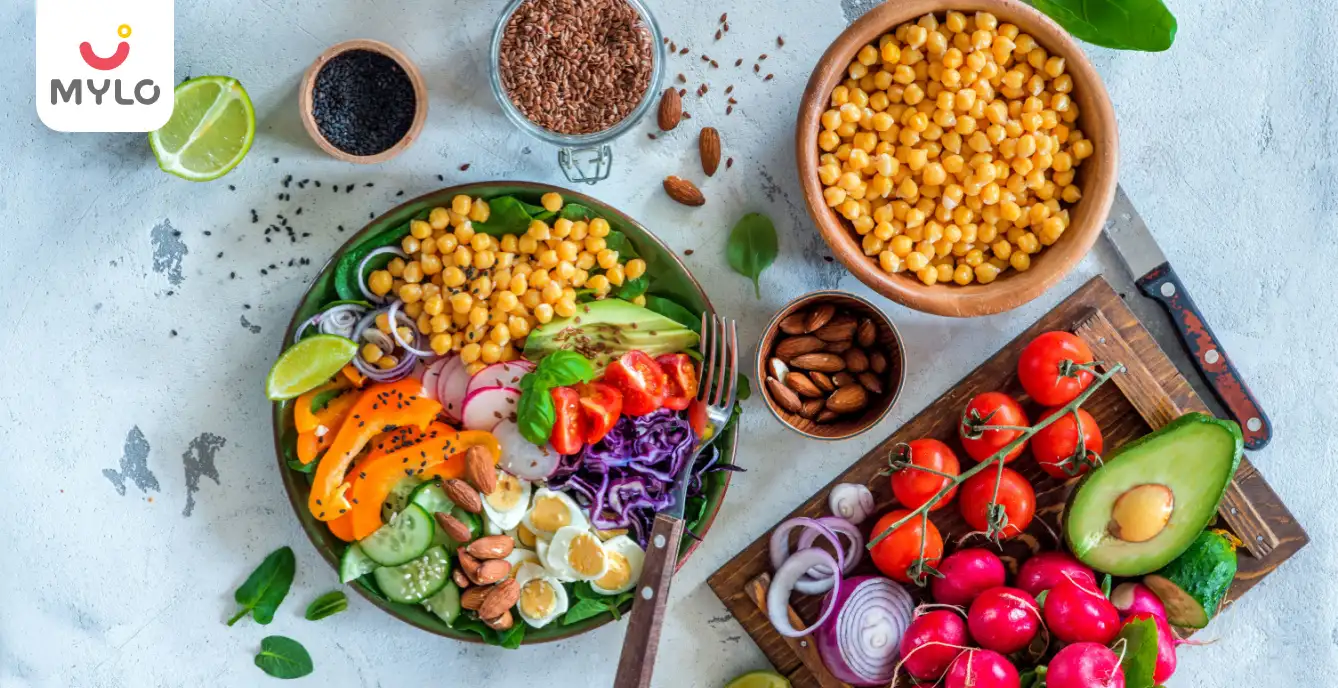Home

How to Increase Breast Milk in One Day?
In this Article

Breast Changes
How to Increase Breast Milk in One Day?
Updated on 4 February 2026
As you embrace the beautiful journey of motherhood, breastfeeding is one of the most precious ways to nourish your baby. If you’re concerned about milk supply, along with expert tips and a healthy diet, some mothers also choose trusted support options like Mylo Lactomama Lactation Granules to complement their breastfeeding routine. In this guide, we will explore effective strategie
How to Increase Breast Milk Instantly?
From foods to increase breast milk in one day to tips to promote breast milk flow, let us understand some ways that can help you increase your breast milk supply:
1. Increase the number of breastfeeding sessions
You can increase the number of breastfeeding sessions by bouncing and burping your baby for 10-20 minutes as soon as they finish a feed. This will help to make more room in their tummy for milk and you can feed them as soon as they are ready.
2. Increase the number of midnight feeding sessions
Prolactin, the hormone that is responsible for milk production, usually peaks between midnight to 5 am. Make the best of this time by feeding your baby within this time slot to help increase your breast milk supply.
3. Avoid pacifiers
All of your baby’s suckling needs should be met by your breasts and not by pacifiers. So, try to avoid using pacifiers, especially in the first month to boost your breast milk supply.
4. Include additional pumping sessions
Since emptying your breasts frequently is important to increase your breast milk production, try to pump between or after feedings. Pumping can help improve your milk supply, especially when your baby is not nursing efficiently or frequently.
5. As your baby is nursing, pump the other breast
You can help boost your milk production by pumping your other breast while your baby is still nursing. Try to do this for the first feed in the morning because that’s when your body produces the most milk.
6. Switch breastfeeding positions
Switching breastfeeding positions or your hand positions while expressing can help apply pressure to different parts of the breast, which will stimulate different milk ducts and increase more breast milk to come out.
7. Try massaging your breasts
Massaging your breasts before a feeding or pumping session and even during breastfeeding can help maximise your breast milk supply. You can also use warm compresses before feeding sessions to simplify the process.
How to Increase Breast Milk in One Day?
If you wish to know how to increase breast milk supply, then here are some tips you can incorporate into your breastfeeding routine:
1. Ensure baby is latched on well
Ensuring a proper latch can solve most of your breastfeeding problems. But if your baby’s latch isn’t right, then you should express milk to maintain your breast milk supply while taking steps to correct the bad latch.
2. Provide both breasts in each session
Make sure to let your baby finish the first side fully before offering them the other. Emptying the breast before offering another can help to increase your breast milk supply.
3. Try switch nursing
Switch nursing refers to switching back and forth between breasts multiple times during breastfeeding. This can help encourage your sleepy or distracted baby to nurse longer.
4. Hand expression
Hand expression can help boost your milk supply if done regularly. You can express yourself in quick 2-minute sessions before, between or after breastfeeding and pumping sessions.
How to Increase Breast Milk Supply?
While knowing how to increase breast milk instantly can help you in the initial breastfeeding days, here are some general guidelines that can help you keep up your breast milk supply:
1. Keep pumping after the last drops of milk
To make sure your breasts are fully empty, hang on for up to 5 minutes after the last drops of milk have dropped during your pumping session.
2. Avoid practices that reduce milk production
Consuming alcohol, smoking or wearing tight bras can affect your ability to produce milk negatively. Avoid these practices along with any over-the-counter or prescription medicines that may dry up your milk supply.
You may also like: 17 Foods to Avoid While Breastfeeding: The Ultimate Guide for New Moms
3. Try power pumping
Power pumping refers to pumping for an hour, wherein you use a breast pump for 10 minutes and then rest for 10 minutes until the clock strikes an hour.
4. Engage in skin-to-skin contact
Spending skin-to-skin time with your little one can help encourage your loving hormones and feelings, which will help increase your milk production.
5. Try herbal supplements like Shatavari
You may also want to try Ayurvedic herbs like Shatavari, which can help improve prolactin levels, promote milk flow, reduce stress and support the immune system.
6. Ensure proper hydration
In order for your body to produce enough breast milk, it’s important to stay hydrated. Try to drink 12-16 glasses per day to meet your hydration and breastfeeding goals.
Foods to Increase Breast Milk in One Day
Certain foods are believed to have lactogenic properties, meaning they may help increase breast milk production. Here are some foods and their potential mechanisms for increasing breast milk production:
1. Oats, Brown Rice and Barley
These foods are rich in complex carbohydrates, which provide a good source of energy for lactating mothers. Carbohydrates are essential for maintaining milk production. Additionally, oats, brown rice, and barley are high in fiber, which can aid in digestion and overall gut health, supporting the body's nutrient absorption.
2. Fenugreek, Fennel and Sesame Seeds
Fenugreek and fennel are well-known galactagogues, which means they are believed to stimulate milk production. Fenugreek contains compounds that may increase the production of the hormone prolactin, which plays a vital role in milk synthesis. Fennel and sesame seeds are also thought to have estrogen-like properties that can support lactation.
3. Spinach, Carrots, Sweet Potato and Bottle Gourd
These vegetables are rich in various vitamins and minerals that are beneficial for lactating mothers. Spinach, carrots, and sweet potatoes are excellent sources of vitamin A, which supports healthy lactation. Bottle gourd is a hydrating vegetable that can help with overall fluid intake, important for milk production.
4. Salmon, Eggs
Salmon is a good source of omega-3 fatty acids, particularly DHA (docosahexaenoic acid), which is crucial for the baby's brain development. Eggs are rich in protein and contain essential nutrients like choline, which may benefit both the mother and baby during breastfeeding.
5. Almonds, Dates
Almonds are a nutritious source of healthy fats, protein, and calcium, which are essential for lactating mothers. Dates are high in natural sugars and can provide a quick energy boost, helpful for sustaining energy levels during breastfeeding.
6. Moringa and Basil Leaves
Moringa leaves are rich in vitamins and minerals, including iron, calcium, and vitamin C, which can support maternal health and milk production. Basil leaves are believed to have lactogenic properties that may help increase milk supply.
7. Chickpea and Legumes
Chickpeas and legumes are high in protein and provide a good source of sustained energy for lactating mothers. They are also rich in essential nutrients like iron and folate, which are important for postpartum recovery.
8. Cow’s milk
Cow's milk contains essential nutrients like calcium, vitamin D, and protein, which are vital for bone health and overall well-being during breastfeeding. Consuming cow's milk can help maintain the mother's nutritional status, benefiting both her and the baby.
The Bottomline
We hope this article was able to answer your question: how to increase breast milk in one day. Try to be consistent with the above tips and techniques and you will surely see improvement soon. And don’t hesitate to get help from a lactation expert.
References
1. Kent JC, Prime DK, Garbin CP. (2012). Principles for maintaining or increasing breast milk production. J Obstet Gynecol Neonatal Nurs.
2. Jackson PC. (2010). Complementary and alternative methods of increasing breast milk supply for lactating mothers of infants in the NICU. Neonatal Netw.

Increase Breast Milk Supply with LactoMama ™ Lactation Granules - 300g - Pack of 1 | Elaichi
100% Natural Ingredients | Improves Lactation | Clinically Tested | Rich in Vitamins, Minerals, Iron & Calcium
₹ 499

4.5
(19410)


126655 Users bought



Written by
Anupama Chadha
Anupama Chadha, born and raised in Delhi is a content writer who has written extensively for industries such as HR, Healthcare, Finance, Retail and Tech.
Read MoreGet baby's diet chart, and growth tips

Related Articles
RECENTLY PUBLISHED ARTICLES
our most recent articles

Diet & Nutrition for Mothers
Indian Food to Increase Breast Milk: Everything You Need to Know

Medications
Dolo 650 During Breastfeeding: Expert Advice and Guidelines for Nursing Mothers

Cold & Cough
Home Remedies for Cold During Breastfeeding: How to Keep Both Mom and Baby Healthy

Fever During Breastfeeding: Tips from Experts for New Moms

Side Effects of Breastfeeding While Lying Down: Is It Worth the Risk?

17 Foods to Avoid While Breastfeeding: Expert Guide for New Moms
- What to Pack and What to Skip When Travelling with a Baby
- How Baby Sleep Patterns Change in the First Year and What Parents Can Do
- Choosing the Best Baby Diapers in India for a Rash-Free, Happy Baby
- What Kind of Diapers for Babies Keep The Little One's Comfortable, Dry and Happy
- Indian Food Chart for Your 10-Month-Old Baby – Week 1
- 10 Month Old Baby Food Chart/Meal Plan – Week 2
- 10 Month Old Baby Food Chart/Meal Plan – Week 3
- Indian Food Chart for Your 8-Month-Old Baby – Week 1
- Best Christian Baby Boy Names That Are Unique and Timeless 2026
- The Ultimate Collection of Girl Baby Names in Tamil 2026
- Yellow Discharge Before Period: Is It Normal or a Cause for Concern?
- Evaporation Line vs Faint Positive: The Ultimate Guide to Pregnancy Test Results
- How to Check Pregnancy at Home with Fingers?
- North Indian Diet Plan for New Moms (0–6 Months Baby)


AWARDS AND RECOGNITION

Mylo wins Forbes D2C Disruptor award

Mylo wins The Economic Times Promising Brands 2022
AS SEEN IN
















- Mylo Care: Effective and science-backed personal care and wellness solutions for a joyful you.
- Mylo Baby: Science-backed, gentle and effective personal care & hygiene range for your little one.
- Mylo Community: Trusted and empathetic community of 10mn+ parents and experts.
Product Categories
baby carrier | baby soap | baby wipes | stretch marks cream | baby cream | baby shampoo | baby massage oil | baby hair oil | stretch marks oil | baby body wash | baby powder | baby lotion | diaper rash cream | newborn diapers | teether | baby kajal | baby diapers | cloth diapers |




